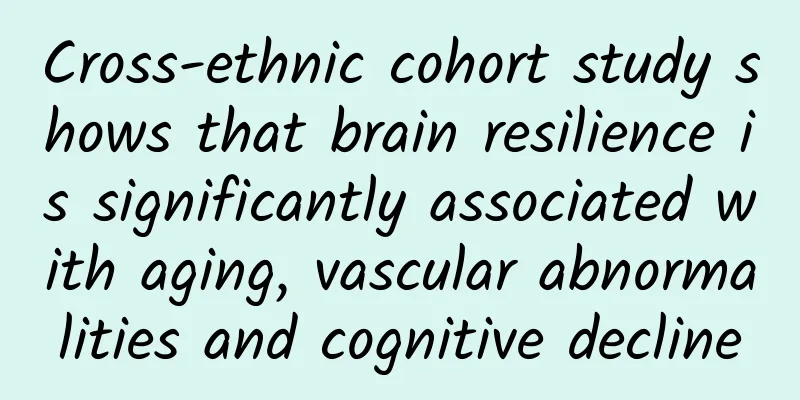Cross-ethnic cohort study shows that brain resilience is significantly associated with aging, vascular abnormalities and cognitive decline

|
As we age, various brain abilities such as cognition gradually decline. However, because the brain has a certain degree of resilience, it will slow down the rate of this decline. Current studies have shown that cognitive impairment and cerebrovascular disease in late life are the result of a series of events in the life process, among which vascular risk factors play a vital role. However, traditional indicators in current brain health assessment tools, such as brain morphology and volume, cannot significantly reflect these risk factors. It is particularly important to develop new objective indicators that can reflect risk factors for neurological diseases. Studies have shown that human brain connectomics can quantify and analyze global changes in brain topology based on a network perspective, and brain resilience reflects the brain's ability to withstand external perturbations, and its resilience level also reflects an anti-aging ability. Therefore, the innovative brain resilience index designed based on brain network theory is expected to overcome the above difficulties and become an effective biomarker reflecting the early state of potential brain and nervous system diseases. Recently, Professor Liu Tao's team from the School of Biological and Medical Engineering of Beihang University and Professor Wang Yongjun's team from Beijing Tiantan Hospital affiliated to Capital Medical University proposed an innovative objective evaluation index reflecting the level of brain resilience - brain topological resilience (BTR). This indicator is calculated based on the brain structure network, using algorithms such as the percolation model to quantify the damage process and achieve quantitative assessment of brain resilience. In two large cross-ethnic community cohorts, the significant association between brain resilience and aging cognitive level and cerebrovascular risk level was verified. The results were recently published in Science Bulletin. Figure 1 Article abstract The study calculated brain topological resilience based on two large community cohorts (Figure 1). The white matter fibers of the brain were reconstructed by fiber tracking of the subjects' diffusion magnetic resonance images, and the brain regions were divided using the standard segmentation template Brainnetome to obtain a brain network of 246 nodes. Afterwards, the study combined the K-shell decomposition algorithm and the node centrality characteristics to quantitatively calculate the resilience index of the network. Afterwards, the study analyzed the association between brain resilience and aging, vascular abnormalities, and cognition. Finally, the study constructed a structural equation model to explore the role of brain resilience in the "aging-cognitive decline" model, and compared it with the traditional brain morphology indicator brain volume to verify the specificity of the brain resilience indicator. Figure 2 Association between brain resilience and aging, cognition, and vascular abnormalities The study found that brain resilience indicators showed significant associations with aging, vascular risk factors, and atherosclerosis in both population cohorts. Brain topological resilience showed a negative correlation with age, vascular risk factors, and atherosclerosis indicators, but a positive correlation with brain cognitive ability (Figure 2). This suggests that brain resilience may be a basic feature that supports cognitive ability, and brain resilience will be damaged with aging and the accumulation of vascular risks. In order to further explore the supporting role of brain resilience on brain cognition during aging, this study used structural equation modeling to analyze the mediating effect of brain resilience. The results of the structural equation model showed that compared with traditional brain morphology indicators (brain volume), brain resilience can significantly mediate the effects of aging, vascular risk factors, and atherosclerosis on cognitive decline (Figure 3). This result suggests that the accumulation of vascular risk factors may lead to cognitive decline by affecting brain resilience. This indicator is expected to become an important indicator for assessing brain health in middle-aged and elderly people, and also provides new insights for exploring cognitive protection strategies during aging. Figure 3 Brain topological resilience mediates the pathways by which aging and blood vessels affect brain cognition For more details, please read the full article Exploring the link between brain topological resilience and cognitive performance in the context of aging and vascular risk factors: A cross-ethnicity population-based study. Science Bulletin (2024). DOI: 10.1016/j.scib.2024.04.018 |
<<: Correctly deal with overweight during adolescence
>>: Who would have thought that “greasy” fruits could become a source of nutritional “clear water”?
Recommend
Are peas considered carbohydrates? What delicacies can be made with pea flour?
Pea flour is a kind of health food with extremely...
How to check whether progesterone is normal
It is very important for pregnant women to check ...
Is green plum easy to survive? What is the cultivation method of green plum?
Green plum is a common flower in life. Many peopl...
Introduction to Postpartum Recovery after Caesarean Section
How can you become a mother as soon as possible a...
What are the dangers of urethritis?
Urethritis is a common gynecological disease amon...
Leucorrhea pus cell positive
During routine examination of leucorrhea, if leuc...
What is uterine prolapse? Learn about the risks and care of uterine prolapse in five minutes
Uterine prolapse is a common disease that often o...
What are the common sense of breast enhancement?
Breasts are one of the most important parts of a ...
Inhomogeneous echo in scar after medical abortion
After medical abortion, if the scar is uneven in ...
How to massage your breasts during pregnancy
Pregnant women's breasts will also undergo ma...
Is there menopause after menopause?
When female friends reach a certain age, they wil...
What are the must-check items for women's physical examination?
Nowadays, women pay more and more attention to th...
Should I buy a new model or an old model? What is the difference between a new model and an old model?
Nowadays, the automobile industry is updating and...
Can confinement granules cure confinement diseases?
Some friends may not be careful during the confin...
What are the three theories about eating wontons during the summer solstice?
Summer Solstice, also known as "Summer Festi...









